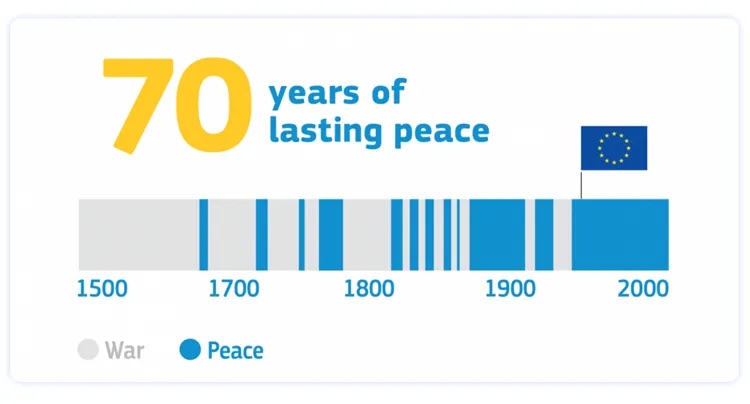As UK public feeling shifts back to a pro-European stance, is it time to positively charge the nature of the conversation? Bremain Chair Sue Wilson writes for Yorkshire Bylines.
Although it has taken far too long to materialise, Brexit is finally up for discussion. Endless tales of Brexit damage now fill the media, even of the right-wing variety. Polls now regularly show that the public have not only turned against Brexit, but are increasingly in favour of a return to the single market, the customs union, and even the EU itself.
That change in public opinion has come about without any benefits of EU membership even being mentioned. Not only that, but public support for Brexit has fallen away despite blatant governmental mistruths about our abilities to act as an independent nation over, for example, the vaccine roll-out or support for Ukraine.
The fact that the public and the media can now clearly see the elephant in the room is progress, and welcome, even if it hasn’t yet trickled down to our parliamentary representatives. But any talk of Brexit now follows an ill-advised path, that of fear, doom and gloom. It has become a negative story of damage and failure, and it’s eerily reminiscent of the underlying negativity (albeit prophetic) of the cross-party Remain campaign.
Project Fear
The pre-referendum approach taken by David Cameron’s government and their pro-European allies in the opposition – labelled as ‘Project Fear’ by the Leave campaign – was a failure waiting to happen. Not only did the government fail to grasp the nation’s desperate desire for change, but their pessimistic campaign provided little factual information about the EU itself and, crucially, very little hope.
What was missing then, as now, was any celebration or explanation of the benefits of our 40-year long relationship with our friends and closest neighbours. Instead, the Leave campaign mendaciously persuaded the majority of the voting public that any benefits were nothing to do with the EU, or at the very least, would not be lost when we left.
EU achievements and tangible benefits
Before Brexit, most people’s knowledge of the benefits of EU citizenship was sketchy at best and misinformed at worst. Having since experienced the loss of many valuable rights, their absence has made our hearts fonder. We better understand now how little we knew of the EU and how much we took for granted.
Less familiar still, were the key achievements of the European Union, as they see and promote them. The list of the EU’s four key achievements on the European Union website is no doubt the envy of democracies across the globe:
- A continent in peace
- Freedom for its citizens to live, study or work anywhere in the EU
- The world’s biggest single market
- Aid and development assistance for millions of people worldwide
Peace and stability
The foremost achievement of the EU has been decades of peace across the continent. Following World War II, Western European countries sought closer political ties, with the aim of achieving economic growth and military security. Decades later, Europe has now seen “70 years of lasting peace” – the longest period in its history.
In accordance with this unbroken “peace, stability and prosperity”, the EU continues to foster “democracy, fundamental freedoms and the rule of law – across the globe”. As a result, it was awarded the Nobel Peace Prize in 2012.
The war in Ukraine has proved the value of collaboration and cooperation with our neighbours for the benefit and security of all. Ukraine is now en route to becoming an EU member itself, having been granted “the status of a candidate to accession” in June 2022. No doubt the people of Ukraine understand only too well the benefits that EU membership will bring.
The single market
Where other benefits of EU membership may not be as well understood, the benefits of single market membership are more widely appreciated, even by Brexit supporters. In fact, many prominent Brexiters regularly assured the public that the benefits of single market membership would still be ours outside of the EU.
The single market allows for four freedoms of movement – of goods, services, money and people. Even some staunch Brexiters appreciate the value of the first three. However, the free movement of people was painted as the cause of unacceptable (to them) levels of immigration. Thanks to the likes of Nigel Farage and his toxic ‘breaking point’ poster, EU citizens, along with the EU itself, were effectively ‘othered’ in the eyes of some of the public.
Nobody is making a positive case for immigration
If there is one benefit of EU membership that’s crying out for a positive political campaign, it’s immigration. ‘Taking back control’ of our borders and reducing immigration was a rallying cry of the Leave campaign. The fact that before the referendum the British public did not appear to have a problem with EU citizens coming to the UK to live, work or study, didn’t factor into their thinking.
Apart from ignoring the positive aspects of EU immigration – on our economy, trade and culture – taking back control of our borders has not worked. Although EU immigration is down since Brexit, net migration numbers are now reaching record levels at over 500,000 in 2022. This at a time when businesses are begging the government to make it easier for them to employ staff from the EU.
Not only does the UK need migration from the EU, but we desperately need to change the dialogue. EU citizens have had a positive impact on our economy, trade and culture and have been our family, friends, colleagues and neighbours, for decades. Our country needs a return to the days of friendship, cooperation and tolerance – qualities we used to be proud of and which were the envy of the world.
The loss of freedom of movement affects us the most
Whilst it’s incredibly sad and damaging that EU citizens are leaving the UK, or have stopped coming, they at least are left with other options. EU citizens still have their freedom of movement across Europe, can move around with ease, and are welcomed with open arms.
UK nationals, on the other hand, have lost the automatic opportunity to live, love, study, work and retire in 27 EU countries. It’s not impossible to move to the EU post-Brexit, but it is considerably more complicated and expensive and no longer an option for everyone. For example, those relying on a UK state pension as their sole source of earnings would no longer meet the income threshold for retirement in Spain.
Not only is it more difficult to plan a life in the EU, but over 2500 Brits that had already made that commitment are now being expelled and sent back to Blighty. It would rather seem as though the EU are better at taking back control of their borders than the UK appears to be.
1000s of Britons expelled from EU. An unelected Eurocrat should not comment on the words of an elected politician. BUT it is sad to recall PM Johnson said “British people will still be able to go to work in the EU; to live; to travel; to study & buy homes” https://t.co/R5AQ0UEMto
— Graham Blythe (@EUEdinGraham) January 7, 2023
Recent polls tell us that Brexit is no longer the “will of the people”. That pervasive idiom was used by politicians as justification for the hardest Brexit possible, and should it go horribly wrong, either the public at large, remain supporters, or the EU were to be made the obvious scapegoats.
Whether Brexit ever really was the will of the people is highly debatable. What isn’t debatable is that Brexit no longer has public support, even if our politicians refuse to accept the facts.
It’s high time we all took a fresh look at Europe. Whether it’s gradually increasing our engagement with our neighbours or a full-on campaign to become EU members again, it’s time to be honest about the benefits, rights and opportunities that we threw away.
The public and some voices in the media are beginning to shine some light on the reality of post-Brexit Britain. Sadly, in Westminster, burying heads in the sand is still in vogue.
Brexit denial and fear is as strong in political (and some media) circles as it ever was. It’s time to inject some truth, hope and optimism into the discourse and build progressively toward a more positive future for all.







